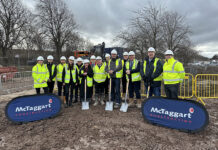
NEW research has found that roofing contractors are enduring mixed fortunes at the moment, with ‘stagnating’ workloads and new enquiries, but also signs of resilience and optimism in certain sectors.
The findings are contained in the latest NFRC State of the Roofing Industry Report, produced in partnership with Barbour ABI.
Over 150 NFRC members took part in the spring survey, which revealed only 36% of contractors reported increased workloads – down from 48% at the end of 2024. New enquiries also dipped slightly, with 33% reporting an increase compared to 36% previously.
However, commercial new build contractors remain optimistic, with 49% expecting workload growth over the next 12 months. Scotland and the Midlands are leading regional optimism, where 60% and 47% of contractors, respectively, expect increases in work over the next year.
Skills shortages continue to constrain capacity, with 47% of respondents reporting that recruitment is harder than the same time last year. The most challenging roles to fill remain tilers, slaters and built-up felt roofers.
In terms of costs, 86% of firms reported increased materials costs, and 79% noted rising labour costs. This is not always reflected in tender pricing, with only 54% seeing higher tender prices – down from 68% previously.
On payments, the picture has improved slightly, with 66% of firms reporting being paid on time – up from 55% in Q4, 2024. However, 32% still reported experiencing issues with late payment. 80% of contractors said that retentions impact their businesses, reinforcing NFRC’s call for reform ahead of a forthcoming government consultation on payment.
Despite the challenges, NFRC members’ confidence remains strong. 90% of respondents said they are proud to be NFRC members and 41% forecast increases in work over the next 12 months. However, support from the government appears to be lacking, with only 4% saying they strongly agree or tend to agree that the UK Government provides the support their business needs.
The top challenges identified were cost of employment (77%); recruitment difficulties (60%); and political uncertainty (37%).
Richard Miller, NFRC director of membership said, “While the industry faces real headwinds, from economic pressures to skills shortages, there’s clear pride in the sector and optimism for the future, particularly in commercial work. This report provides essential insights to help us advocate for Members at the highest levels.”








